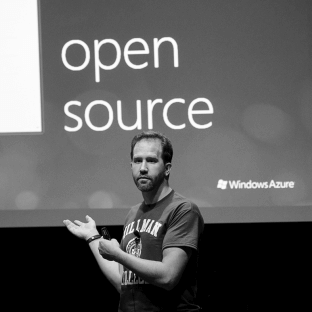What are the greatest challenges to working remotely?
None!
You do miss out on the camaraderie piece, but there are still ways to feel connected to your coworkers virtually. We have a great “water cooler” chat on Slack to just partake in fun conversations and share silly updates—it’s really fun and brings us all closer together as a team. But I do have friends who might find it lonely – so we always say it’s not for everyone and perhaps not for those who love to hang out physically or who like to have lunch with colleagues!
For some, the lack of social interaction is a detractor, but it really is what you make of it. At Appirio, we conduct nearly every meeting through Google Hangouts or GoToMeeting with our webcams on. It allows for greater personal interactions with coworkers, even if we’re on opposite sides of the country.
You lose a lot of the community you otherwise have by default. That said, this can also be a benefit, as it incentivizes you to spend more time with the people you choose to have in your life, rather than just people who happen to sit in the cubicle next door.
There are two things that a remote worker must be strong in: focus and compromise. These two may at first seem at cross purposes, but they are actually strong complements to each other.
It is easy for a remote worker to lose focus without the structure of an office environment. If you are easily distracted by children, television, the car needing an oil change, the grocery store…the list goes on…then you have to focus on doing the job as you would in an office, but your office is a mental construct, not a physical one.
One friend of mine actually goes so far as to get dressed ‘for work’ and go to his basement. His wife and children know that this is his office. He needed to make the mental transition to ‘work mode’ every day—in a physical sense.
For me, I make the shift mentally. In fact, my wife has to remind me to get up and walk around more often!
Along with this focus, a person has to compromise often. When I was living in Asia and working with clients in North America, I often had 2 or 3 a.m. calls. I never let on that it annoyed me to be up at that hour. It was the ‘price I paid’ for living the way I wanted to.
I go to GREAT lengths to ensure that my choices for where I want to live do not impact my clients or coworkers. Without that commitment, remote work is simply not feasible to me! I have to be the one to change and adapt, not them.
Feels like you’re never disconnected, loneliness, harder to develop strong collegial relationships.
It can be a bit lonely sometimes. I’ve become, after 16 years, a little socially awkward. I also end up working more hours than office workers; it’s too tempting to keep working. Also, blisters. Try not wearing dress shoes for months, and then going somewhere all dressed up. You’ll know what I mean. I often joke about having to put socks on to attend events.
It seems like it would be hard to forge strong friendships with your co-workers when you’re not interacting in person every day. It’s easier for us because we had already been close friends for 6 years before starting the company, but we usually meet up at least twice a year and spend a couple weeks together. I think a quarterly or semiannual company meetup is absolutely crucial for working remotely.
People who don’t work remotely don’t really get it, which means that I’ve found myself having to fend off well-meaning friends and family who think I’m unemployed and therefore able to hang out, do errands or favors, etc. I can’t say I blame them. The uniform looks a little unemployed. (I am wearing sweatpants as I fill out this survey.)
There are days when it’s hard to work at home without any coworkers around. I’m lucky that my husband also works remotely and shares an office with me so I feel a little less alone most days. On days when I’m feeling out-of-touch with my team, I’ll chat a bit more in Slack or have a video conversation with a coworker. Because my team is fully distributed, I don’t experience the fear of missing out that I might otherwise feel. I know that we’re all at home working in our respective offices being interrupted by cats and kids and random visitors!
The uncertainty is a tough one, but that applies whether you’re a remote or local entrepreneur. Those ups and downs!
The understanding that if you get sick, it’s not necessarily an easy fix. I got respiratory infections and dengue fever in Vietnam, and they wreaked havoc on my body. And those times that you get sick are also the times you feel the lack of consistent community and/or care.
Thankfully it’s easy to reach out to fellow, likeminded remote workers thanks to technology, but that doesn’t supplement the more consistent friendships when you move around less.
It’s often challenging to build a deep sense of community when working remotely or traveling. You have to be much more intentional about relationship building, and cultivating an intellectually inspiring community around you that doesn’t revolve around work.
I think one of the greatest challenges is getting virtual private networks to work at the same speed as onsite networks. Conference calling tools and collaborative applications are often more geared toward an onsite setting. Improving the clarity and velocity of voice and video communication for VPN users would help streamline communication between employees, regardless of their location.
Explaining to others that we do indeed work. We are accountable and passionate, which often has us working more hours (and not less, as they believe).
People still subconsciously treat remote workers as if they are less valuable, less dedicated, less productive. Plus, your success or failure as a remote worker is almost 100 percent dependent upon your manager’s perspective.
It’s important to make the effort to retain social connections because they are not innately available to you. In short, it can get lonely. Another downside is the misconceptions and perceptions of others based on your remote work situation. For example, spouses and significant others often expect that if you are working from home, then you should be able to not only do your job but also manage household chores. Often peers and relatives doubt whether or not you have a bona fide job if you don’t go to a worksite to do it.
When people go remote, they struggle with discipline, isolation, being “always on,” and finding a productive workspace.
When teams are remote, they struggle with having high-quality conversations, staying aligned, building trust, and maintaining a sense of team.
If I am not organized it’s easy to get overwhelmed. I can feel when it’s happening and have learned that in that moment, whatever is going on, I need to admit I’m in over my head and I need to regroup. There’s no one to tell you that on a daily basis when you work remotely. You are your own boss with goals you need to hit.
It can also get a bit lonely working remotely. I’ve had to find ways to get socialized to satisfy that need to connect with others so that I can continue to grow personally and professionally.
We are a husband and wife team which has incredible benefits though sometimes work can creep too much into our personal lives. Going to different offices with different projects each day would probably relieve some of that…but then we wouldn’t be a on a tropical island together and able to go surf and hike when we wanted.
(For someone working remotely for a company) I would say the biggest downside is not building strong relationships with co-workers and your boss, which could limit advancement, assuming other employees are in the office daily.
Not being able to commit to anything.
- I was in the middle of a 1 year RCIA program at my church in Montreal when I upped and left.
- It’s hard to stick to a workout routine. Sure, running you can do from anywhere, but if you need weights you need to find a gym, which is a challenge, or rather, time-consuming on top of having to find a place to stay, places to work from… Also some don’t have day/week passes, or they do but are expensive. Or they don’t have AC. #firstworldproblems
- “Eating clean” is hard as well. If you live in a hotel or studio, it probably doesn’t have a kitchen; and it’s hard to find meals of brown rice, whole wheat bread, etc. when eating out. It’s also not feasible to travel around with a bottle of olive oil for example.
- Of course dating is a challenge as well.
Networking. Sure, I network online, but it’s so much easier to build relationships in person. I often wish I could connect more with other people like me working in content marketing, at tech companies, or just working in the same digital, creative space.
The greatest downsides to working remotely are: no paid holidays, and distractions you deal with from working from home like from TV and social media.
I miss major conversations that happen spontaneously in the hallway.
Over the years, I’ve seen discipline as the achilles heel of many friends. There’s this myth of the remote worker lounging in pajamas and living the high life once they’re not bound to an office. The reality is a far cry different. Although the pajamas are still often a part of the equation, it’s much harder to form the discipline of setting your own schedule and meeting deadlines. Without external forces (coworkers and bosses nearby), you have to show a great deal more discipline and organization of your time to make the lifestyle work effectively for you.
It can be a bit lonesome if you don’t manage your time appropriately. For example, I try and keep normal hours so that when my friends are off work, so am I. This enables me to go and visit whenever I can. Another thing is being accountable for yourself. When starting out, I’ll admit that I wasn’t the most strategic with my time—resulting in a lot of stress and procrastination.
I’m not sure I find anything challenging about it—other than occasionally having to explain to someone that working from home doesn’t mean I don’t work.
You can become a bit isolated. I think the ideal arrangement is a mix of onsite work and telecommuting.


























